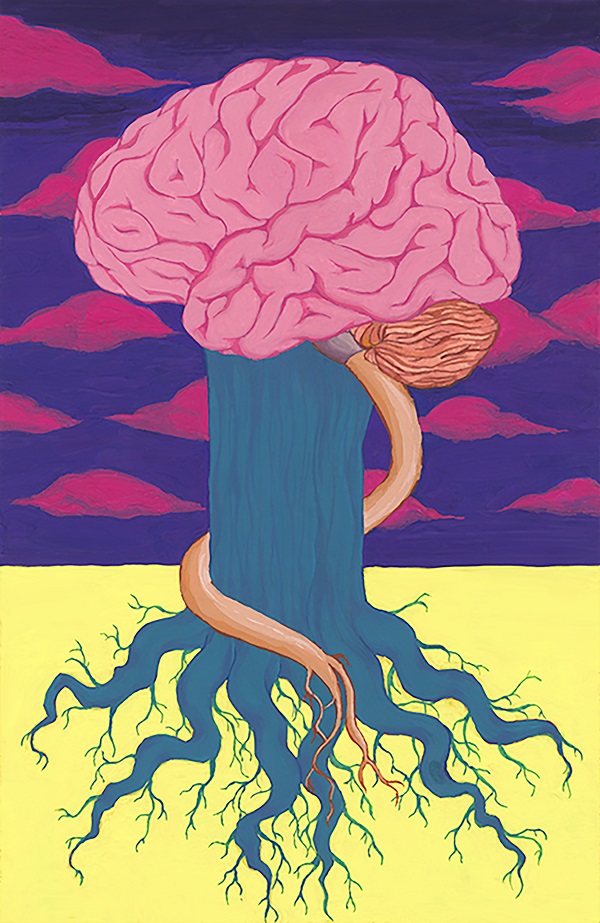The GL.TCHy Psycho-Logic of the Human Brain
Illustrated by Malika Chim
When I think of a GL.TCH, I think of something weird, out of the ordinary, something which may seem like a mistake but often is not. When something seems out of place we tend to take it as incorrect, but there’s often a reason why it belongs there. In light of this sense of GL.TCH, we can reflect on something that may seem like the biggest glitch of all time, something that is always right here, inside of us, something that in a certain way IS us: our human mind.
 For as long as I can remember, the human brain has always intrigued me: how do we think? What is a thought? What are dreams? Why do we sometimes zone out? How do we function? How does the brain create mind?
For as long as I can remember, the human brain has always intrigued me: how do we think? What is a thought? What are dreams? Why do we sometimes zone out? How do we function? How does the brain create mind?
So much about our brain and mind seems glitchy. For instance, in our waking life, we have moments when we blank, when we temporarily zone out, where we just space (pun intended). Asleep, we dream: our subconscious mind takes over and simulates a fictional situation using our store of memories. How do we explain these weird experiences, among many others? What’s even stranger is that without understanding these experiences we can nevertheless control them, at least to some extent: for example, when we become aware of being in a dream state, we can enter a process known as lucid dreaming, where our conscious mind takes over in the subconscious, giving the person control of their dream, the power to shift the “reality” of the dream however the person sees fit.
In addition to these normal, healthy glitches, there are also the apparent glitches of malfunctions in our brain and mind, from Parkinson’s Disease to Alzheimer’s. We have some knowledge of these diseases, as in we understand some of what happens in them, what symptoms appear, but what about the root causes of them?
Scientists can still barely answer any of these questions and many others about the organ at the seat of our consciousness. Of course, we have identified parts of the brain such as the frontal lobes, responsible for voluntary movement, and the hippocampus which stores all of our memories. (In fact we are not 100% sure of what it does exactly; there are still competing theories). Some of those memories are accessible to us, but many, for normal and abnormal reasons (such as trauma), are not. We also know that synapses in the brain, which are basically electrical impulses, are responsible for transforming stimuli from the outside into thoughts, but HOW are those thoughts created?
And what about our sensations? For instance, why do we visualize? If we were to replicate those billions of chemical filled shocks in a lab, would we re-create a human thought? Or what about emotions? Take one of the most curious emotions of all: love. What is the connection between electrical impulses in our brain and this complex experience we are all familiar with called love, which can cause people to make some of the most illogical actions imaginable? If we associate the brain with logic, then love seems to be another glitch, preoccupying our thoughts with the idea of one person who we want to spend as much time with as possible, even if it’s extremely inconvenient for us, even sometimes at great sacrifice to ourselves.
We know so little about our brain and mind that although so much of our mental functioning seems glitchy, there may be a reason for it, not logical, perhaps, but psychological, which we are still waiting to discover.
Here are some links to documents on the brain and mind that I found interesting:
http://engineering.mit.edu/ask/what-are-thoughts-made
http://www.livescience.com/39665-blank-minds-still-dream-at-night.html
http://www.briantracy.com/blog/general/understanding-your-subconscious-mind/
http://infiniteminds.info/Lucid-Dreaming/How-are-dreams-created.html
https://www.amazon.ca/Brain-That-Changes-Itself-Frontiers/dp/0143113100

Comments
No comments posted yet.
You have to be registered and logged in in order to post comments!